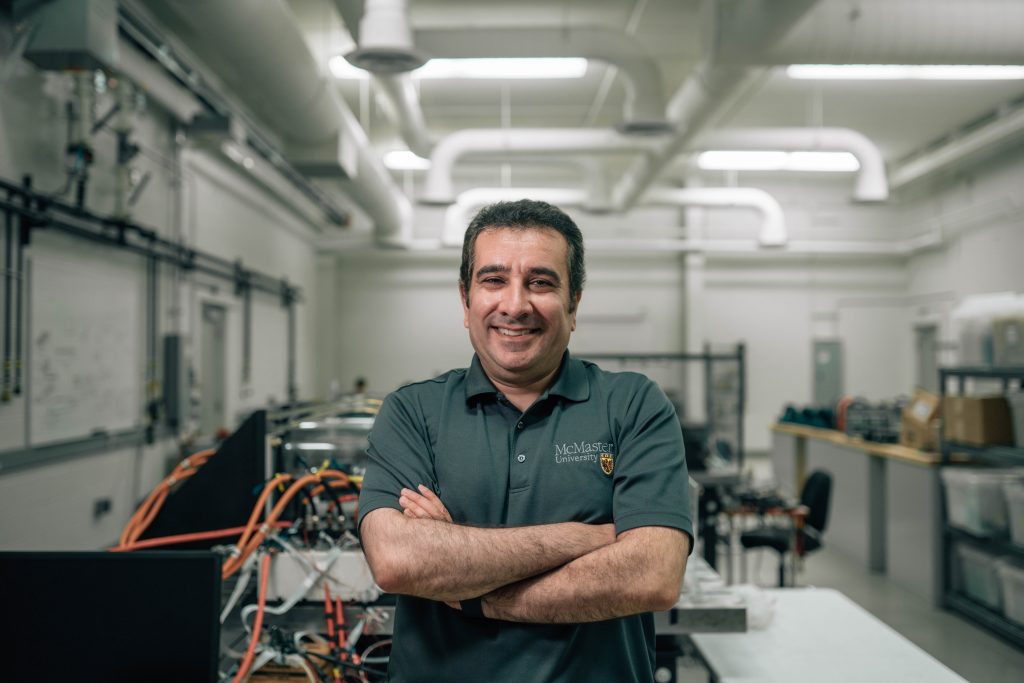Driving change: Rethinking mobility to build the transportation system of the future

McMaster researcher Ali Emadi, a global expert on vehicle electrification and smart mobility, is determined to build a more inclusive transportation system that is safer, more equitable, more reliable and more sustainable.
BY Jesse Dorey
January 23, 2023
An older adult who needs a few extra seconds to cross the street. A recent newcomer who needs help navigating an unfamiliar city. A person with a disability using public transit.
Each of these individuals face unique barriers to safe, efficient and accessible travel. And many of the current transportation systems fail every one of them.
But it doesn’t have to be that way.
McMaster researcher Ali Emadi, a global expert on vehicle electrification and smart mobility, is determined to build a more inclusive transportation system that is safer, more equitable, more reliable and more sustainable.
His research group has partnered with Cubic Transportation Systems (CTS), an industry leader in transportation technology and innovation, to create the Centre of Excellence for Artificial Intelligence and Smart Mobility, where a diverse team of scientists, engineers and students are hard at work building the transportation system of the future.
Based out of the McMaster Automotive Resource Centre (MARC), the research group is marrying McMaster’s commitment to sustainability and inclusivity with Cubic’s cutting-edge transportation infrastructure and solutions.
With a firm commitment to diversity and the knowledge that mobility needs vary from person to person, the team is not only changing the way we get from point A to point B; they’re also revolutionizing the way we think about transportation systems as a whole.
“Mobility and transportation are overdue for new thinking that will open access and improve mobility for all,” says Emadi, Canada Excellence Research Chair Laureate and professor of electrical and computer engineering and mechanical engineering.
“With the right approaches, we can make all forms of mobility, along with the systems that organize and connect them, more accessible, inclusive, functional and sustainable for everyone.”
An integrated approach
By building artificial intelligence (AI) directly into our transportation systems, Emadi hopes to help revolutionize and influence everything from personal travel to city planning.
The partnership with CTS combines McMaster’s technical expertise and freedom to both dream up and build the smart systems of the future with Cubic’s industry know-how to bring them to market as viable solutions.
At the Centre of Excellence, Emadi and his team of researchers and students are leveraging their expertise in artificial intelligence and smart mobility to build a fully integrated, intelligent transportation system that incorporates diverse needs.
Emadi describes a project that uses sensor technologies at intersections to make them safer.
At any major intersection in any city, rows of gas-powered cars sit idling at a red light while cross-traffic speeds through the intersection. Others wait to turn the corner while pedestrians with a range of abilities cross the street at different speeds. Cyclists ride by in bike lanes while buses and ride shares pull over for passengers.
A whole host of things can go wrong at any given moment.
But many intersections are also equipped with different types of sensors. McMaster researchers are working on an integrated system of sensors and devices that can identify traffic issues and manage them in real time.
This type of integrated system would assist with traffic management while ensuring that both drivers and pedestrians are given the time they need to safely pass through the intersection.
“If our technologies are implemented in Toronto or New York or Sydney or Chicago and nudge people toward more efficient, integrated smart mobility solutions,” says Emadi, “the whole system would be better.”
Diversity from the start
Beyond the expertise in AI, the project’s strength lies in the team’s commitment to inclusion at every step of the way.
“Different people have different abilities and different disabilities,” says Emadi. “We need to consider those things and adapt to them.”
To build a transportation system that is truly equitable, you need to consider and account for a range of diverse perspectives at every stage of the design process, Emadi says.
“What we do at McMaster that sets us apart from a lot of different places,” explains Emadi, “is that when we do artificial intelligence, machine learning and smart mobility, we ensure that [equity, diversity and inclusion] is brought into everything.”
Emadi’s focus on inclusion begins with his research team.
“If you start with a truly diverse team of engineers, scientists, researchers, students and professors,” explains Emadi, “the future systems of smart mobility you design have truly diverse thinking from the beginning.”
Emadi’s team at the Centre of Excellence is evenly split between people identifying as male and female, and he ensures that diverse voices and people with different abilities and disabilities have a spot at the table and are encouraged to draw on their lived experiences to inform the user experience.
Making space for diverse voices and perspectives from inception to completion ensures that the needs of everyone are incorporated into groundbreaking technologies from the very beginning, Emadi says.
“Artificial intelligence, for all its promise, can only be as good as the data we put into it,” says Emadi.
“This is a critical time to make sure our thinking is as diverse and inclusive as possible, so our approaches to mobility can meet the needs of everyone.”


